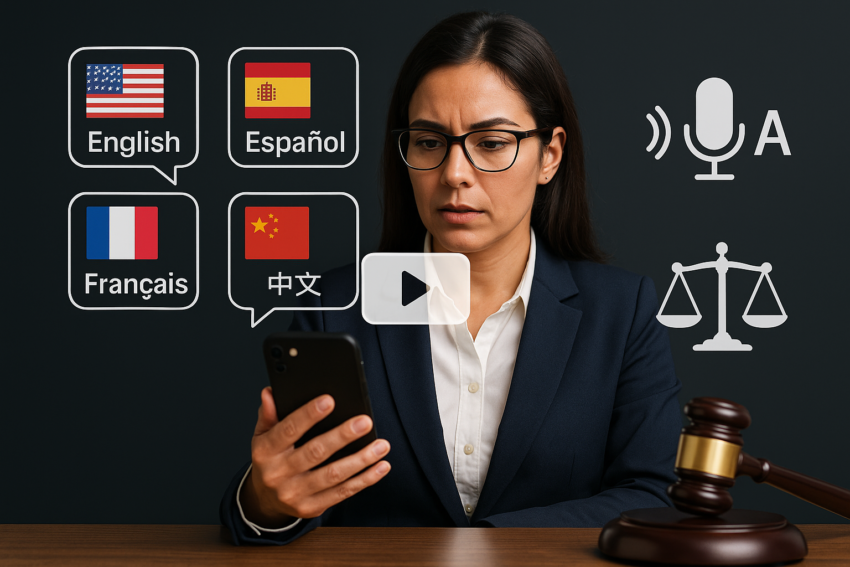In today’s globalized legal landscape, you often face situations where legal communication must transcend borders, cultures, and most importantly, languages. Whether you’re a lawyer handling a multinational corporate dispute or a compliance officer navigating international trade regulations, clarity in communication is critical. Modern international law firms increasingly turn to advanced AI technologies to manage these challenges, ensuring that legal concepts are accurately conveyed across linguistic boundaries.
From cross-border mergers to complex social media lawsuits, the ability to interpret and relay information in multiple languages can make or break a case. As you work in or with international law, you may already have noticed how the speed of technology adoption has reshaped the way legal teams operate. In areas such as intellectual property rights, international arbitration, or commercial law, tools powered by AI are becoming essential in safeguarding business interests, particularly when different languages are involved.
AI’s Role in Modern Legal Communication
International law relies heavily on precision. A single mistranslated clause can alter the meaning of a legal agreement, resulting in costly disputes. Traditionally, law firms depended on human translators with legal expertise, a method still respected for its nuance but limited by time and scalability. AI now offers a complementary approach, providing faster, scalable, and increasingly accurate translation services.
Today’s AI-driven tools do more than text translation. They can handle voice, video, and even real-time multilingual communication, enabling you to participate in international hearings or negotiations without language becoming a barrier. This is especially useful for commercial lawyers representing multinational companies, where meetings can involve participants from multiple countries in the same session.
Making International Legal Content More Accessible
Consider the increasing use of video as evidence in court or as a tool for client communication. In a multinational legal dispute, you might need to share recorded testimony, compliance training, or investigative footage with teams spread across continents. Here’s where AI steps into a more specialized role: AI-powered video translation.
If you were collaborating with a cross-border legal team, an AI video translator could transform a recorded deposition in one language into versions accessible to all parties involved. For example, a platform like Invideo AI enables you to not only convert the spoken content into another language but also synchronize the voice tone and pacing so it feels natural to the listener.
This combination of legal accuracy and accessibility ensures that every stakeholder receives the same message, without delays that traditional translation workflows might introduce.
With this capability, you could take a single video and generate multiple language versions, allowing you to address a truly global audience. It’s not only about translating words, it’s about preserving meaning, tone, and legal accuracy across different cultures and jurisdictions.
Expanding Applications: From Depositions to Digital Courtrooms
As international law increasingly incorporates digital tools, video has become central to legal communication. Courtrooms in multiple jurisdictions now accept video evidence, and some hearings are conducted entirely online. With AI voice translation, you can make spoken testimony or legal arguments instantly understandable to participants speaking different languages.
Imagine presenting a witness statement recorded in Spanish to an English-speaking arbitration panel. Instead of providing a written transcript alone, you can deliver an audio-translated version that matches the original speaker’s inflections. This can add credibility and emotional clarity that text alone can’t convey.
In more public-facing scenarios, such as international regulatory updates or awareness campaigns, AI can make legal information widely accessible. Paired with apps like an AI video generator, you can even create multilingual video content from scratch, saving both time and resources. For social media lawsuits, where content might need to be reviewed and presented in several languages, this is particularly valuable.
Serving Commercial and Public Interests
Commercial lawyers protecting their clients’ interests often need to ensure that marketing materials, contracts, and policy updates comply with regulations in multiple jurisdictions. Inaccurate translation could mean violating consumer protection laws or misrepresenting product terms. With AI-enhanced video translation and transcription, you can distribute legally compliant content in every market you serve, without having to recreate the message from scratch for each region.
Similarly, in public policy or governmental communication, where the audience spans multiple nations, AI-driven language tools can play a decisive role. Public advisories on trade laws, international agreements, or compliance frameworks can be disseminated in video form, each tailored linguistically to the target audience, without losing the original legal intent.
Ethical Considerations and Best Practices
While AI’s benefits are clear, you still need to approach its use in international law with caution. Accuracy must remain the highest priority, and human oversight is non-negotiable for critical legal communications. AI can automate and accelerate translation, but the complexity of legal language often requires human review to ensure contextual correctness.
Moreover, when you use AI in legal translation, data privacy and confidentiality must be maintained. Legal evidence and client communications are often sensitive; any technology partner you choose should comply with relevant security and privacy regulations.
The Future of Language and Law
As AI continues to evolve, it will likely become an even more integral part of how you communicate in international legal contexts. Real-time multilingual negotiation tools, AI-assisted legal drafting in multiple languages, and immersive virtual hearings where participants can speak naturally in their own language are all within reach.
The global nature of legal practice today means that breaking down language barriers isn’t just a convenience; it’s a necessity. By integrating technologies like the AI video translator into your workflow, you can ensure that legal accuracy, clarity, and accessibility are upheld across borders. This empowers you to serve clients, courts, and communities with greater efficiency while preserving the integrity of the law in every language it touches.

